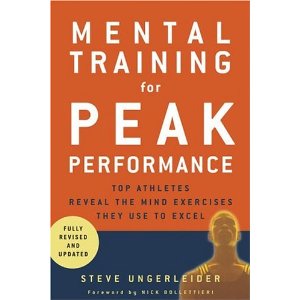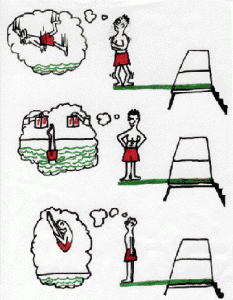Mental Training Techniques of Top Athletes
Top athletes are not only physically fit but also mentally fit. They use mental training routines just as they use physical training routines. Fortunately, many if not all of their mental training routines can be used to improve brain function or enhance cognitive performance in non-sports related contexts.
 A great resource for exploring these techniques is Steven Ungerleider’s book, Mental Training for Peak Performance. He offers an introduction to mental training and then covers specific techniques including affirmations, self-talk, breathing, mediation, mental snapshots, guided-imagery, visual rehearsal and even dreams. We have covered many of these techniques in the Next Brain blog, but Dr. Ungerleider brings refinements and deeper insights to nearly all of them.
A great resource for exploring these techniques is Steven Ungerleider’s book, Mental Training for Peak Performance. He offers an introduction to mental training and then covers specific techniques including affirmations, self-talk, breathing, mediation, mental snapshots, guided-imagery, visual rehearsal and even dreams. We have covered many of these techniques in the Next Brain blog, but Dr. Ungerleider brings refinements and deeper insights to nearly all of them.
Take for example the use of guided-imagery. This is a technique involves forming vivid mental images and controlling them to practice “in your head” and manage anxiety and performance stress. Ungerleider’s approach stresses understanding how the individual experiences the image – sight, hearing, touch and feel. Other approaches I’ve seen assume we experience images with sight only. He has even developed a Sport Imagery Questionnaire (pgs. 56-57) to help you figure out how you experience images. You assess yourself in four different situations – practicing alone, with others, watching a teammate and competing – and rate how you experience images (1-5) in terms visual (what you saw), auditory (what you heard), kinesthetic (what you felt) and mood (how you felt). You use the results to customize routines for generating and controlling vivid imagery.
I completed the questionnaire and was surprised to find that mood played a key role in how I experience mental imagery. I used this to change my approach to guided-imagery with some good results.
Interested to hear from readers about their experience using the mental training techniques inspired by sports.
Categories: Books, Manage Emotions, Memory and Learning, Mental Focus, Perception, Training Tags: sports
Develop Your MOT – Multiple Object Tracking Skills
 CogniSens Athletics is a small company dedicated to translating the latest neurophysics into tools for improving the cognitive performance of athletes. They just announced the release of 3D-MOT a three dimensional (3D) immersive training environment for developing the cognitive skills needed for multiple object tracking (MOT). It uses a computer and specialized goggles to teach you how to visually track more than one moving object at a time. A key cognitive skill in sports. To quote a news release:
CogniSens Athletics is a small company dedicated to translating the latest neurophysics into tools for improving the cognitive performance of athletes. They just announced the release of 3D-MOT a three dimensional (3D) immersive training environment for developing the cognitive skills needed for multiple object tracking (MOT). It uses a computer and specialized goggles to teach you how to visually track more than one moving object at a time. A key cognitive skill in sports. To quote a news release:
“D-MOT is a scientifically designed system for improving perceptual tracking skills by expanding an athlete’s capacity to absorb and process complex movement information. … players have shown that just one hour of distributed 3D-MOT stimulation yielded an average of over 50% increase in capacity to track at speed, with greater increases being realized with extended training. ”
 Most of us won’t have the opportunity to use such technology but I wonder if there is not more generally available options that produce some of the same effects. My guess is that some video games are an example.
Most of us won’t have the opportunity to use such technology but I wonder if there is not more generally available options that produce some of the same effects. My guess is that some video games are an example.
Consider Geometry Wars. Definitely need to be able to track multiple moving objects at once to get anywhere with this game. Indeed, in playing it, I have had to learn to defocus my eyes to increase my score. Most likely a sign that I am learning a new perceptual skill.
I am interested to hear from readers about examples of video games or other methods that can help us develop MOT (multiple object tracking) skills.
Categories: Mental Focus, Perception, Software, Training Tags: cognitive fitness, games, processing speed, sports
Mental Practice Makes Perfect
Playing things out in your mind before you actually do them is a great way to improve performance in many different types of tasks. Mental practice or rehearsing is a technique that is taught to athletes, managers, high-performance sales people and many other professionals. How to improve you skill in mental practice will be a frequent topic on the Next Brain Blog.
For a quick introduction check out Head Games: An Introduction to Mental Rehearsal by Dr. Scott Williams a Professor of Management and Director of the Center for Innovation at Wright State University.
He offers this nine-step procedure for doing mental practice (and I quote):
 “Find a time and place where you won’t be interrupted.
“Find a time and place where you won’t be interrupted.- Recline or lie down, and close your eyes.
- Relax, concentrate, and focus. Take deep breaths and exhale slowly. As you exhale, imagine that stress is leaving your body. Start at your feet … feel all the stress leave your feet … then your legs … then your chest … all the way to the top of your head … feel all the stress leave your body. Free your mind of distractions and allow your mind to focus on the relaxation process.
- Once relaxed, focus on the specific challenging task.
- Mentally tell yourself that you are confident and that you have the ability to perform this task successfully. Repeatedly tell yourself, with confidence, that you will be successful.
- Imagine what you will see just before you begin the task. Visualize yourself as an active participant, not as a passive observer. For example, to mentally rehearse putting a golf ball, imagine that you are standing on the green rather than watching yourself from the gallery.
- Remaining relaxed and focused, mentally rehearse successful performance of this task. Imagine going through the process and seeing successful results.
- Repeat step 7 several times.
- Finally, open your eyes and smile. You have successfully performed in your mind, which is great preparation for actual performance. You should now be confident that you will perform successfully in the real situation. Remember to praise yourself for being successful. Self-reinforcement is another a key to self-motivation.”
Try this out on a task or performance you have coming up in the next couple of days. Does it work? Leave a comment and share your experience and results.
Source: Image of Diver
Categories: Memory and Learning, Training Tags: brain training, sports
